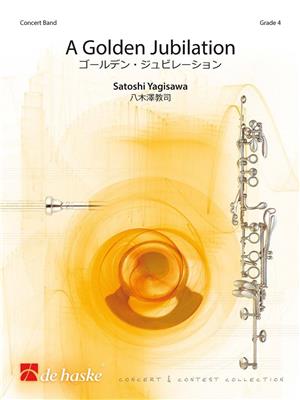Results
-
 £84.99
£84.99A Golden Jubilation - Satoshi Yagisawa
This work was composed as a commission by the Aikodai Meiden High School Symphonic Band, for the 50th anniversary of their annual concert; the title A Golden Jubilation is a reference to this. The close friendship between Hiroki Ito, theconductor of the band, and Satoshi Yagisawa resulted in this brilliant and exhilarating fanfare of approximately two minutes in length; the piece is ideal to use as a concert opener. The original composition was arranged for an extremely wide rangeof instruments and a band of 200 musicians, including a separate 'banda', harp and a variety of special instruments. This new version has been rescored for standard band instrumentation by the composer himself.
Estimated dispatch 7-14 working days
-
£61.95
Spring Unfolding - Peter Terry
Spring Unfolding celebrates the possibilities of new life, as trees and growing plants follow the light and green emerges to cover the remains of winter. The piece begins with a contemplative opening before diving into a liltingly tuneful 3/4 melody. Delightfully unique, this piece is perfect for beginners.
Estimated dispatch 7-14 working days
-
£61.95
Rays Of Light - George Sweet
Rays of Light is an upbeat, positive piece for developing ensembles inspired by the return of light after a dark storm. Composer George Sweet has an indelible style that incorporates a fresh harmonic perspective not commonly found in pieces at this level with simple, tuneful melodic gestures. Every section of the band is given a chance to shine in this delightful new piece for beginning band.
Estimated dispatch 7-14 working days
-
£106.95
Amazing Grace - Tyler Arcari
Amazing Grace has become a staple in celebrations of both life and death. This setting is meant to celebrate the life of a fellow musician. Tyler Arcari's new take on this old favorite will make a truly fresh addition to your band's repertoire.
Estimated dispatch 7-14 working days
-
£106.95
Polar Vortex - Gene Milford
The Polar Vortex is the mass of extremely cold air situated over each of the earth's poles. Occasionally the vortex slips away from the polar region bringing unusually cold air to areas away from the pole. Polar Vortex is a depiction of a winter storm inspired by the poem by Ralph Waldo Emerson, "The Snow-Storm." It is a rhapsodic piece with many contrasting moments, styles, tempos, and colors of sound. A sophisticated new work from composer Gene Milford.
Estimated dispatch 7-14 working days
-
£67.95
Angel Echoes - Larry Clark
As the title implies, Angel Echoes uses a lot of echo effects throughout, and is based on the interval of a descending perfect fifth. The piece begins with a lush statement of the subtle "angel" theme, which is used throughout the piece and ultimately as the climactic material later in the work. With teachable material steeped in musicality, this remarkable new work for developing ensembles will not disappoint.
Estimated dispatch 7-14 working days
-
£67.95
Invictus Rex - Matthew N. Putnam
Invictus Rex is the Latin phrase for an invincible or undefeatable king. It calls to mind a paragon of strength, boldness, and confidence in the face of challenges and adversity. Audiences will imagine a medieval king attired in heavy armor confidently leading his men into battle, assured in the idea that, though the battle is to be long and arduous, they will ultimately reign victorious. New composer Matthew Putnam draws on his experience as a music educator to provide us with this piece that students will absolutely love to play.
Estimated dispatch 7-14 working days
-
£123.95
The Star-Spangled Banner - Sean O'Laughlin
Composer/arranger Sean O'Loughlin has provided a refreshing new setting of our National Anthem. It was originally written for orchestral brass and percussion and has been performed at both MLB and NBA events. The arrangement begins with a bold fanfare to set the tone, but also to provide the motive glue to hold the arrangement together and create something unique. Creative harmonic usage and colorful orchestration really make this version stand out from the rest.
Estimated dispatch 7-14 working days
-
£78.95
Breaking News - John M. Pasternak
Has a monster started terrorizing your city? Has the mayor been re-elected? We've got Breaking News! Find out what the news is about at the end of this fun piece for young band. The title says it all in composer John Pasternak's new piece reminiscent of a news program theme. It is exciting, unique, and students will love to play it again and again.
Estimated dispatch 7-14 working days
-
£84.50
Sunchaser - Carol Britten Chambers
The contemplative opening measures of Sunchaser set the mood by depicting the dawn of a new day, quickly launching into a spirited adventure full of energy and life. Composer Carol Brittin Chambers gives us a beautiful work rife with musical imagery that students will love to play. Sunchaser is a perfect selection to highlight the strengths of your young band at your next festival.
Estimated dispatch 7-14 working days
